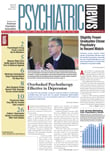On March 1, the U.S. Drug Enforcement Administration (DEA) exercised its emergency scheduling authority to control five chemicals (JWH-018, JWH-073, JWH-200, CP-47,497, and cannabicyclohexanol) known as synthetic cannabinoids used to make so-called "fake pot" products.
Except as authorized by law, this action makes possessing and selling these chemicals, or the products that contain them, illegal in the United States. "The action was necessary to prevent an imminent threat to public health and safety," the DEA said in a news release. "The temporary scheduling action will remain in effect for at least one year while DEA and the U.S. Department of Health and Human Services study whether these chemicals should be permanently controlled."
Already outlawed in many European countries, at least 18 U.S. states, and all branches of the U.S. military, the chemicals were placed in the Schedule I category, the most restrictive under the Controlled Substances Act.
The emergence of these five synthetic cannabinoids represents a recent phenomenon in the U.S. designer-drug market, said the DEA. Although these chemicals have not been approved for human consumption, they have become readily available in just a few short years. Synthetic cannabinoids are a large family of chemically unrelated structures biologically similar to tetrahydrocannibinol (THC), the active principal component of marijuana. Dissolved in solvents such as acetone and sprayed onto plant material, they are marketed as smokeable herbal products and known most commonly by the names "spice" and "K2."
Many synthetic cannabinoids originated in the laboratory of John William Huffman, an organic chemist at Clemson University since 1960, where more than 470 analogs and metabolites of THC have been synthesized. Huffman's research goals included the potential development of new pharmaceutical products and exploration of the geometry of both the cannabinoid brain (CB1) and peripheral (CB2) receptors. Huffman's lab developed JWH-018 in 1995, and he describes it as "quite potent and easy to make."
The synthetic cannabinoids first appeared in the United States as potential drugs of abuse in November 2008 when U.S. Customs and Border Protection first encountered them. The increasing abuse of synthetic cannabinoids is demonstrated by the increase in federal, state, and local law-enforcement activity associated with these substances. Since 2009, the DEA has received an increasing number of reports from poison-control centers, hospitals, and law-enforcement agencies regarding these products.
In addition, emergency-room physicians have reported that individuals who use these products experience serious side effects that include convulsions, anxiety attacks, dangerously elevated heart rates, increased blood pressure, vomiting, and disorientation. The risk of adverse health effects is further increased because similar products vary in the composition and concentration of synthetic cannabinoids spiked on the plant material, and products may contain other unknown chemicals with undetermined effects. "These five substances have the potential to be extremely harmful and, therefore, pose an imminent hazard to the public safety," the DEA stated.
